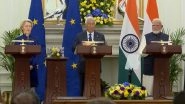Washington, July 18: Facebook's planned global digital coin Libra has run into a wall of opposition in Washington that could prevent its launch as envisioned, but analysts say cryptocurrencies are likely to make gains around the world nonetheless. The plan by Facebook and its partners has generated skepticism from US lawmakers and G7 finance ministers as well as from central banks and regulators globally.
Lawmakers have also raised concerns over Facebook's spotty record on privacy and data protection. Facebook's scale -- with some 2.7 billion users for all its applications -- means the proposed Libra currency could roil the global financial system and make the job harder for the world's central banks. Facebook Libra: France Says G7 Consensus to 'Act Quickly' On Cryptocurrency.
"If people are using Libra as a stored value and holding a lot of money in it, you might have less effective monetary policy," said Martin Chorzempa, a research fellow at the Peterson Institute for International Economics. The US Federal Reserve, for example, "can affect the dollar but it might not affect Libra in the same way."
Since the Libra would likely hold the dollar, euro and other major currencies as reserve assets, the impact could be significant in "emerging markets or developing countries where people want to get rid of those currencies," Chorzempa said. "Imagine the demand for Libra in a place like Venezuela," where the currency has collapsed from hyperinflation.
Hoping to avoid the wild swings of other virtual currencies, Libra would be governed by a non-profit association backing up the coin with a basket of major global currencies. Lamont Black, a finance professor at DePaul University, said Facebook has yet to fully explain how the Libra Association, with up to 100 members, would operate.
"That's really the role of a central bank," Black said. Libra is most likely "dead in the water," at least for the US market, said analyst and cryptocurrency investor Lou Kerner. There are "too many regulatory bodies and government agencies with potential oversight responsibilities, too much uncertainty at Libra about what it's going to be, and too little knowledge about the topic for there to be consensus around a regulatory framework."
Kerner said the US government wants the dollar to be the global reserve currency, and will oppose any "threat to that." US Treasury Secretary Steven Mnuchin has said that Facebook must meet "a very high standard before they have access to the financial system." G7 finance ministers also expressed a "need for action" on Libra at a meeting this week.
"One has to wonder how much more criticism Facebook wants to take before it cuts bait," said Nicholas Colas of DataTrek Research. Facebook argues, and many experts agree, that if Libra fails, other digital currencies will gain traction -- something that is already happening.
"If we fail to act, we could soon see a digital currency controlled by others whose values are dramatically different," David Marcus, the head of Facebook's initiative, told lawmakers this week.
(The above story is verified and authored by Press Trust of India (PTI) staff. PTI, India’s premier news agency, employs more than 400 journalists and 500 stringers to cover almost every district and small town in India.. The views appearing in the above post do not reflect the opinions of LatestLY)













 Quickly
Quickly


